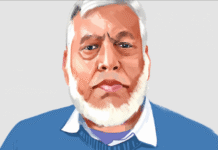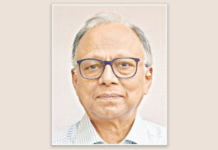
In two global rankings in recent times, Bangladesh has found itself in the unenviable position of being one of the countries where people are the least happy. First, there was the Global Emotions Report 2022, released by the polling giant Gallup, which ranked Bangladesh as the seventh saddest nation in the world. Then last month, Bangladesh was ranked 118th out of 137 countries in the World Happiness Report 2023, a publication of the UN Sustainable Development Solutions Network. The sudden flurry of international recognition demands scrutiny of what is otherwise still a non-issue in our policy circles: people’s happiness.
Of course, measuring subjective ideas like happiness or sadness is a tricky business. It gets trickier when you try to measure an entire nation’s “state of mind.” But there is a growing consensus about how collective happiness, or lack thereof, should be measured. In the UN report, for example, countries were ranked based on people’s life evaluations in six key factors: social support; GDP per capita; health; freedom; corruption; and generosity. Your level of satisfaction in each indicator adds up to a picture of how you are as a nation.
I’m not going into details on why we have scored so poorly. Suffice to say, it was bound to happen. Just take a look around, soak in all the lunacy, agony and commotion, and ask yourself: if you were to evaluate your lived experience in this climate, would you have rated differently? Doomed to a life of self-perpetuating crises – from indoor to outdoor, cultural to political, medical to environmental, academic to economic – people may naturally despair more.
But this last part is where I think the UN et al got it wrong. Today, despite the myriad crises in our life, or perhaps because of them, we are not just sad – we’re quite happily and dutifully so.
Happiness, for a nation, is a matter of choice, just as sadness. If we don’t strive for change, or hold our government accountable, or unite and see past our prejudices for the greater good, we are choosing a life of sadness for ourselves.
Pardon the oxymoron, but think about it: if our cost-of-living crisis is really a product of a sweeping cost-of-profiteering crisis, where’s the initiative to address it? If crimes and civil rights violations are so widespread, where’s the sense of urgency to prevent them? If corruption is eating away all our economic gains, why are we doing nothing about it? If pollution has reached alarming levels, why is there no indication of that alarm in our behaviour? If “state repairing” is what we think we need, why are we still so conflicted about it? Lack of active citizenship is as much to blame for a protracted crisis as the lack of initiative from the government.
In other words, if the state is responsible for creating the conditions that are making us sad or unhappy, our reaction to it as citizens is helping to perpetuate those conditions, making us equally complicit.
At a certain level, we seem to have resigned to the inescapability of our crises, allowing crisis fatigue to set in. And if you must remain in a state of misery, you might as well try to accept it, internalise it, and even have a laugh about it if possible, right? It’s like an abusive relationship that you can’t “just leave.” You are no longer a passive spectator then; you are an active abettor in your own undoing. Happy to serve, happy to suffer.
One side effect of a lengthy exposure to so many unresolved crises is that it vitiates how we think or interact with each other. A good metaphor for a nation that fails to evolve would be a landlocked lake where water is stagnant, or a room without ventilation where the air becomes damp. Nothing fresh hardly comes out of it. Such an environment breeds confusion and cynicism. We start to distrust everyone. We forget to laugh. We hate jokes, or satire, or cartoons, lest we are tricked into happiness just for the sake of it. We dissect every move and every inspiration until – to quote Javier Bardem’s character from Vicky Cristina Barcelona – “each grain of charm is squeezed out of it.” But we’re happiest when we feel vindicated in our suspicion of others. We toy with the idea of change, but seek accommodation with the status quo.
Just think: when was the last time you saw broad consensus on a nationally important issue, or united pushback against an injustice?
Social media is a perfect ground for such divisiveness. What joy is there in our newsfeeds is overshadowed by the organic outpouring of cynicism that comes through at every opportunity. What happened with Prothom Alo reporter Samsuzzaman Shams or thespian Mamunur Rashid in recent days are examples of how deeply distrusting of everything we are.
In a different reality, their report or comment would have started a healthy conversation about the poverty of the pocket and the poverty of the art, both of which are on full, unabashed display presently. Criticism, either of the government or of artistic practices, is a key requirement for change as it inspires pursuit of better outcomes. This is how civilisation has always progressed. But instead, our cynicism and paranoia again got the better of us. So Shams became a victim of the kind of disingenuous hair-splitting that follows every call for pro-people reform, and Rashid became a victim of the kind of vilification that follows every wannabe reformer.
A polarised nation is really a paralysed one. It moves without purpose, debates without honesty, and fights without conviction. Of course, some things are beyond the control of citizens, and here comes the responsibility of those in power. A government can ensure people’s happiness by making the right decisions with regard to human rights, health, education, governance, living standards, etc. But to force the government’s hand is the responsibility of the citizens.
Happiness, after all, is a matter of choice, just as sadness. If we don’t strive for change, or hold our government accountable, or unite and see past our prejudices for the greater good, we are choosing a life of sadness for ourselves.
Badiuzzaman Bay is assistant editor at The Daily Star.











Absolutely brillainly written article – a very acurate portrayal of the current sad state of Bangladesh and its people.
Until recently, I used to be quite proud everytime I was told that “Bangladeshis are such a resillient people”. Not any more. Resillence is a virtue and a curse. Too much of resillience means you accept wrong as given and make no efforts to right the wrong. Instead, strive to survive either by co-opting or by by-pass the wrongs – “happy to serve, happy to suffer”. Time people “force government’s hand” for “happiness”, for a better society.